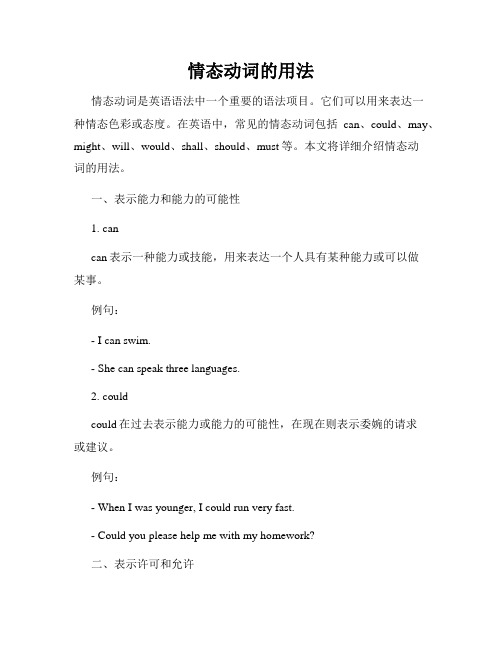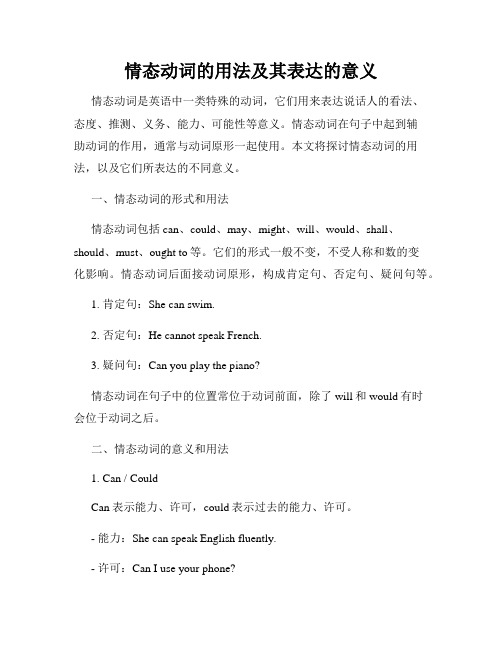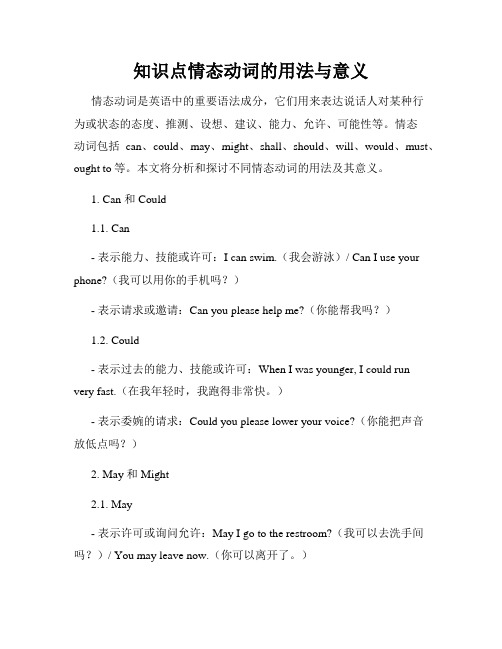情态动词shall,should, must 用法及练习
情态动词的用法

情态动词的用法情态动词是英语语法中一个重要的语法项目。
它们可以用来表达一种情态色彩或态度。
在英语中,常见的情态动词包括can、could、may、might、will、would、shall、should、must等。
本文将详细介绍情态动词的用法。
一、表示能力和能力的可能性1. cancan表示一种能力或技能,用来表达一个人具有某种能力或可以做某事。
例句:- I can swim.- She can speak three languages.2. couldcould在过去表示能力或能力的可能性,在现在则表示委婉的请求或建议。
例句:- When I was younger, I could run very fast.- Could you please help me with my homework?二、表示许可和允许may表示请求和征求允许的委婉方式。
例句:- May I borrow your pen, please?- May I ask you a question?2. cancan表示许可和允许,与may往往可以互换使用。
例句:- Can I have another piece of cake?- Can I go to the party tonight?三、表示可能性和推测1. maymay表示对某事发生的可能性的推测。
例句:- It may rain tomorrow.- He may be late for the meeting.2. mightmight表示对某事发生的低可能性的推测。
- I might travel abroad next year.- He might not come to the party.四、表示义务和必要性1. mustmust表示义务和必要性,强调说话人的主观判断。
例句:- You must finish your homework before going out.- We must be at the airport by 8 o'clock.2. have tohave to表示外部的义务和必要性,比must更加客观。
法律英语翻译中情态动词的用法

法律英语翻译中情态动词的用法法律英语翻译情态动词用法shall和shouldshall在合同文件中是使用频率最高的词,在合同文件中shall表示强制性承担法律或合同所规定的义务,在表达"应该"或"必须"做某事时,应用"shall"而不能用" must"或"should",但有时可用"will",力度比shall 弱。
Should在法律文件中往往作"if"解,只表示"如果"之意。
如:The board meeting shall be called and presided over by the Chairman. Should the chairman be absent, the vice-Chairman shall, in principle, call and preside over the board meeting.文中:两个shall,都表示有责任做,应该做之意。
Should: If 表示如果。
board meeting:董事会会议。
preside over:主持。
原文可译为:董事会会议应由董事长召集、主持;如董事长缺席,原则上应由副董事长召集、主持。
shall, may和must的否定句Shall在法律条文、合同条款处在两种情况下可以不译外,主要可以被译成"须"、"应"和"应当"等。
但shall与not或其他否定形式(如用否定词No/neigher开头的句子)连用时,一般不能顺其自然,译成"不须"、"不应"或"不要"、"不可"、"不应当",因为这几个词的意思在汉语里主要表示"建议"或"忠告";在语用上,口语色彩较重,表示"禁止"的语气不够强烈;大量既定的权威性文献表明:shall not及类似否定式短句的最通常、最恰当的译法是"不得",因为"不得"在汉语里与"禁止"一词同义,与法律英语中含shall的否定句所要表达的意思相同。
试看以下各例:1.The rights and freedoms enjoyed by Hong Kong residents shall not be restricted unless as prescribed by law. Such restrictions shall not contravene the provisions of the preceding paragraph of this Article.香港居民享有的权利和自由,除依法规定外不得限制,此种限制不得与本条第一款规定抵触。
情态动词的用法及其表达的意义

情态动词的用法及其表达的意义情态动词是英语中一类特殊的动词,它们用来表达说话人的看法、态度、推测、义务、能力、可能性等意义。
情态动词在句子中起到辅助动词的作用,通常与动词原形一起使用。
本文将探讨情态动词的用法,以及它们所表达的不同意义。
一、情态动词的形式和用法情态动词包括can、could、may、might、will、would、shall、should、must、ought to等。
它们的形式一般不变,不受人称和数的变化影响。
情态动词后面接动词原形,构成肯定句、否定句、疑问句等。
1. 肯定句:She can swim.2. 否定句:He cannot speak French.3. 疑问句:Can you play the piano?情态动词在句子中的位置常位于动词前面,除了will和would有时会位于动词之后。
二、情态动词的意义和用法1. Can / CouldCan表示能力、许可,could表示过去的能力、许可。
- 能力:She can speak English fluently.- 许可:Can I use your phone?Could也可以用于表示请求或委婉的建议:- 请求:Could you please help me with my luggage?- 建议:You could try the new restaurant in town.2. May / MightMay表示许可、可能性,might表示过去或将来的可能性。
- 许可:May I borrow your pen?- 可能性:I may go to the party tonight.Might也可以用于表示不太可能的情况:- 不太可能:He might not come to the meeting.3. Will / WouldWill表示意愿、预测,would表示过去的意愿、假设。
- 意愿:I will help you with your project.- 预测:It will rain tomorrow.Would也可以用于表示委婉的请求或建议:- 请求:Would you mind closing the window?- 建议:You would feel better if you took a break.4. Shall / ShouldShall通常用于第一人称,表示建议、义务,should则表示建议、期望。
情态动词的用法区别学会区分情态动词的不同用法

情态动词的用法区别学会区分情态动词的不同用法情态动词的用法区别情态动词是一类特殊的动词,用来表示说话人对某种动作或状态的态度、愿望、能力或推测等情态,在句子中起到限制、修饰其他动词或表达说话人的意愿的作用。
在英语中,常见的情态动词包括can、could、may、might、shall、should、will、would、must等。
理解和正确运用情态动词,对于学习英语的学生来说非常重要。
本文将从情态动词的用法区别展开讨论,帮助读者更好地掌握这一语法知识。
一、表示能力和许可的区别1. can与could的区别can和could都表示能力,但在用法上有一些区别。
can用于一般现在时,表示现在或将来的某种能力,而could则用于一般过去时,表示过去的能力。
例如:He can speak English fluently.(他能说流利的英语。
)He could swim when he was young.(他小时候会游泳。
)此外,could还可用于表示一种委婉的请求或许可。
例如:Could you please pass me the salt?(请你把盐递给我好吗?)2. may与might的区别may与might都表示许可,但may更常用于正式场合,might更常用于非正式场合,且might更加委婉。
例如:May I use your computer?(我可以用你的电脑吗?)Might I borrow your pen? (我能借你的笔用一下吗?)二、表示推测和可能性的区别1. must与may的区别must和may都用于表示推测和可能性,但语气上有一定的差异。
must表示说话人的推测非常肯定,有把握,而may则表示说话人的推测不那么肯定。
例如:She must be tired because she worked all day.(她一定很累,因为整天都在工作。
)She may be tired because she worked all day.(她可能很累,因为整天都在工作。
情态动词的用法及练习(附答案)

情态动词的用法及专项练习第1 & 2类:词形词的含义例句can ①“能力”②“允许”③“可能性”(0%)④“请求”I can speak English.Can I go to the toilet.It can’t be Susan. She is in Paris. Can you help me?could ①“过去的能力”②“过去的允许”③“可能性”(30%)④“请求”, 比can更客气⑤“建议”⑥“将来的一种可能性”She could speak English When she was 5 years old. Could I borrow your dictionary?It could get much colder in January.Could you please say that again more slowly.We could try to fix it ourselves.I think we could go to war again.be able to “能力”= can, 但比can的时态更具多样性。
can无法表达的时态,用be able to表达。
She will be able to teach English. (一般将来时)She was able to talk when she was 2 years old. (一般过去时)I would love to be able to play the piano. (动词不定式)may ①“请求、允许”(比较礼貌)②“将来的可能性”(50%)③may 在更多的时态中经常May I come in?It may rain tomorrow.第1类:十大情态动词can / could / may / might / must / ought to / shall / should / will / would 第2类:半情态词及充当情态动词的词had better / be able to / have to / used to / need / dare用be allowed to来代替might “较小的可能性”(≤30%)I might move to Canada some day.must ①“必须”(责任、义务)②“可能性”(推测) (100%)③“禁止”(否定式) Everyone must pay taxes.She didn’t arrive. She must be sick.You mustn’t p l ay with fire. It’s dangerous.have to ①“必须、不得不”(客观上不得不做)②多种时态里面代替“must”,因must只有一般现在,但have to 可以有多种时态。
情态动词should,may must等用法

Should的用法:1.(shall的过去式,表示过去将来)将会We hoped that we should be able to do that. 我们希望我们能这样做。
★2. should 作为情态动词,可以用在条件状语从句中,表示语气较强的假设,译作“万一”,这时也可将should 置于从句之首,即将should 放在主语前面,而省略从属连词if .例如:◆If you should fail to come,ask Mrs Chen to work in your place. (= Should you fail to come,ask Mrs Chen to work in your place. )万一你来不了,就叫陈夫人代替你。
◆If anyone should come,say I am not at home. (= Should anyone come,say I am not at home. )万一有人来访,就说我不在家。
◆If it should rain tomorrow,I wouldn't go.(= Should it rain tomorrow,I wouldn't go.)◆If the car should break down on the way, you would haveto walk back.◆Ask her to ring me up if you should see her.万一汽车中途抛锚,你就得走回来。
★3.(表示可能性、推测、推论或期待)可能;(按理)应该She should be here any minute.她该马上就到。
Dinner should be ready by now.此刻晚饭应该做好了。
★4.(表示义务、责任)应该,应当You should do as she says.你应当照她说的去做。
知识点情态动词的用法与意义

知识点情态动词的用法与意义情态动词是英语中的重要语法成分,它们用来表达说话人对某种行为或状态的态度、推测、设想、建议、能力、允许、可能性等。
情态动词包括can、could、may、might、shall、should、will、would、must、ought to等。
本文将分析和探讨不同情态动词的用法及其意义。
1. Can 和 Could1.1. Can- 表示能力、技能或许可:I can swim.(我会游泳)/ Can I use your phone?(我可以用你的手机吗?)- 表示请求或邀请:Can you please help me?(你能帮我吗?)1.2. Could- 表示过去的能力、技能或许可:When I was younger, I could run very fast.(在我年轻时,我跑得非常快。
)- 表示委婉的请求:Could you please lower your voice?(你能把声音放低点吗?)2. May 和 Might2.1. May- 表示许可或询问允许:May I go to the restroom?(我可以去洗手间吗?)/ You may leave now.(你可以离开了。
)- 表示推测或可能性:He may be late.(他可能会迟到。
)2.2. Might- 表示推测或可能性,语气比may更弱:She might know the answer.(她可能知道答案。
)- 表示委婉的建议或请求:Might I suggest a different approach?(我可以建议一种不同的方法吗?)3. Will 和 Would3.1. Will- 表示意愿、决心或承诺:I will help you.(我会帮助你。
)/ I will be there at 8 p.m.(我将在晚上8点到达。
)- 表示预测或推测:It will rain tomorrow.(明天会下雨。
初中英语情态动词之shall和should的正确用法

初中英语情态动词之shall和should的正确用法相信很多同学对于shall和should的用法比较容易搞混,下面是小编为您收集整理的shall和should的正确用法,供大家参考!初中英语情态动词之shall和should的正确用法1、shall的用法(1)shall用于第一、三人称陈述句中,表示说话人征求对方的意见或向对方请示。
(2)shall用于第二、第三人称陈述句中,表示说话人给对方的命令、警告、允诺或威胁。
(3)用于所有人称,表示规章、法令、预言等,可译为“必须”。
2、should的用法(1)表示义务、责任或劝告、建议、命令等,意为“应该”。
(2)表示有一定根据的推测、推论或可能性,意为“可能,该”(肯定的语气没有must表推测时强)。
(3)多用于疑问句中,表示惊讶、难以相信或不应该的事。
(4)ought to和should的比较A、ought to也可以表示推论、可能性,和should用法一样。
B、在省略回答中,ought to中的to可以省略。
C、should和ought to表示做正确的事情或理应做的事情。
be supposed to 意为“被期望,应该”,表示被期望发生或根据安排、要求做某事,或认为做某事是正常的。
英语语法速记口诀大汇总一、冠词基本用法【速记口诀】名词是秃子,常要戴帽子,可数名词单,须用a或an,辅音前用a, an在元音前,若为特指时,则须用定冠,复数不可数,泛指the不见,碰到代词时,冠词均不现。
【妙语诠释】冠词是中考必考的语法知识之一,也是中考考查的主要对象。
以上口诀包括的意思有:①名词在一般情况下不单用,常常要和冠词连用;②表示不确指的可数名词单数前要用不定冠词a或an,确指时要用定冠词the;③如复数名词表示泛指,名词前有this,these,my,some等时就不用冠词。
二、名词单数变复数规则【速记口诀】单数变复数,规则要记住,一般加s,特殊有几处:/t?蘩/、/?蘩/、/s/结尾,es不离后,末尾字母o,大多加s,两人有两菜,es不离口,词尾f、fe,s前有v和e;没有规则词,必须单独记。
- 1、下载文档前请自行甄别文档内容的完整性,平台不提供额外的编辑、内容补充、找答案等附加服务。
- 2、"仅部分预览"的文档,不可在线预览部分如存在完整性等问题,可反馈申请退款(可完整预览的文档不适用该条件!)。
- 3、如文档侵犯您的权益,请联系客服反馈,我们会尽快为您处理(人工客服工作时间:9:00-18:30)。
1. shall
(1)用于疑问句与第一、三人称连用,表 用于疑问句与第一、三人称连用, 用于疑问句与第一 示征求意见或请求许可。 示征求意见或请求许可。
• 1) Shall we go out for a meal together? • 2) Shall the newcomer have a try?
• --- When can I come for the
• • • • • •
photos? I need them tomorrow afternoon. --- They ___ be ready by 12:00. A. can B. should C. might D. need It’s nearly seven o’clock. Jack __ be here at any moment. A. must B. need C. should D. can
• 3. must • ---- Must I do it at once? must ---- Yes, you______. / ----No, youneedn’t _____. don’t have to) (=No, you ___________
• You mustn’t waste any more time. • You must not smoke here.
• Nothing shall stop me from going there. 决心 • You shall be sorry for what you have done, I tell you.
威胁/警告 威胁 警告
• 3.You shall get an mp5 as your birthday present this year.(允诺) • 4.The fine shall be paid in cash.
• 1. Trees are good for man. We can’t plant them _____ many. • A so B such • C too D enough • 2. In a rely race, a player can’t run fast _____. • A so B such • C too D enough
(3) must 表示固执 不满 意为“偏偏, 表示固执,不满 意为“偏偏, 不满,意为
偏要,非得” 偏要 非得” 非得
•---- May I smoke here? ---- If you __, choose a seat in the smoking section. A. should B. could C. may D. must
• There __ be any difficulty about passing the road test since you have practiced a lot in the driving school.(05 上海 上海) A. mustn’t B. shan’t C. shouldn’t D. needn’t
• 1.--- The room is so dirty .______ we clean it? • ---- Ok. • A will B Shall • C Would D Do
(2)用于肯定句与二、三人称连用,表示 用于肯定句与二、三人称连用,
允诺,决心,威胁,警告, 说话人的 允诺,决心,威胁,警告, 命令,或法律、 命令,或法律、文件的 规定 。
• 1) It’s 2:30, They should be here now. • 2) The glasses should be enough for each guest. • 3) We should arrive before dark. • 4) The roads should be less crowded today.
• 2. should • 1). Children should be devoted to their parents. • 2).You shouldn’t be so careless. ought not to
• 2)比较有依据的推测将来某种情况, )比较有依据的推测将来某种情况, • “按理说会,估计会” 按理说会,估计会”
• (3)表示惊讶、遗憾、“竟然,居然” 表示惊讶、遗憾、 竟然,居然” 表示惊讶
• I’m glad that his son should have won the first prize. • It’s strange that he should fail again. • You can’t imagine that a wellbehaved gentleman ___ be so rude to a lady. • A. might B. need C. should D. would
(规定) 规定)
• 5. Persons under 18 shall not be employed. (规定) 规定)
“The interest(利息 __ be 利息) 利息 divided into five parts, according to the agreement,” declared the judge. A.may B. should C. must D. shallay the piano at such a late hour? A. Must B. Can C. May D. Need
• 1. Why must you always break in when others are talking? • 2. If you must break the law, of course, you will be punished.
• 禁止 不可以 千万别 禁止,不可以 不可以,千万别
• 2) 肯定推测,“一定,准是”(只能用于 肯定推测, 一定,准是” 肯定句) 肯定句)
• 1. She must be tired after such a long walk. • 2. He must be sleeping now.
• ---Hi, Tom. Any idea where Jane is? • ---She _____ in the classroom. I saw her there just now. A shall be B should have been C must be D might have been
